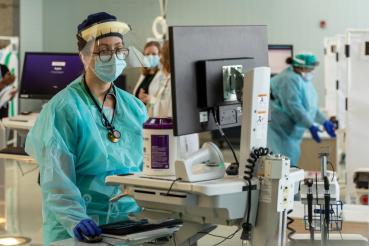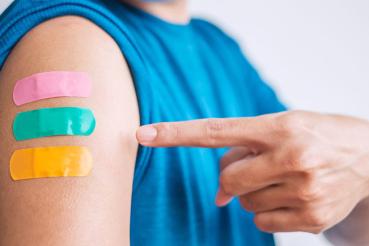On Dec. 1, the first U.S. case of the new COVID-19 variant, omicron, was detected in northern California, less than a week after the World Health Organization deemed it a “variant of concern.” The infected individual was fully vaccinated and had just returned from South Africa, where omicron was first detected.
Michael Lin, MD, MPH, an infectious disease specialist and associate professor at Rush University Medical Center, expects that Chicago won’t be spared from the omicron variant.
“Given how it has spread across the world, we will likely see it coming to our region at some point,” Lin says. “But the question will be how it competes with the delta variant, which continues to be the dominant variant worldwide, and if it will cause a new wave of infection. That is impossible to predict at this point.”
So what can people do to protect themselves against both omicron and delta?
Lin encourages everyone age 5 and older to get vaccinated against COVID-19. He also urges all adults to get their COVID-19 boosters as recommended by the Centers for Disease Control and Prevention. “This will increase the likelihood that the vaccine will provide at least partial immunity,” Lin says.
Mutations may cause the virus to spread faster
How fast omicron could spread through the Chicago area is unclear, but Lin is concerned that omicron’s large number of genetic mutations might give the new COVID-19 variant an edge over earlier strains.
“Viruses evolve through mutations,” Lin says, adding that such mutations could cause omicron to spread more quickly than previous variants. “The omicron variant seems to have outpaced the delta variant in parts of South Africa. So, there’s cause for concern that it may exhibit more efficient transmission properties.”
Vaccines may not be as effective but will still offer protection
Another concern is that current COVID-19 vaccines may not work as well against the new variant. “There are a large number of mutations on the omicron variant’s spike protein, which is the target of vaccines and the antibodies we make,” Lin says. “So, if that spike protein changes substantially, then the antibodies we have as a result of the vaccine or natural immunity may not be as effective.”
However, Lin is encouraged by the fact that current COVID-19 vaccines offer protection through two different means. One way is by training our immune systems to develop antibodies that target the virus. The other is through cell-mediated immunity, in which the vaccine teaches our bodies to fight the virus even without the ideal antibodies, he says.
In a matter of weeks, Lin expects scientists will have more information on the how well existing vaccines work against omicron by testing the blood in vaccinated people who’ve been infected with the new strain. What will likely take longer is determining if omicron can cause more severe COVID-19, as some scientists have speculated, although the evidence is limited so far. “We just don’t know until we have more clinical and epidemiologic data,” Lin says.
Even as the U.S. implements more travel restrictions, Lin does not believe the emergence of omicron will lead to more lockdowns here at home. He is also optimistic that the months ahead will not be as difficult as the first months of the pandemic, thanks to the vaccines. “My guess is that we’re beyond the worst of the pandemic, and that includes the lockdowns,” he says. “I believe that the vaccines, although they will be imperfect, will still provide some measure of protection.”
Delta remains key concern
Lin says the delta variant remains the immediate concern for Chicago and the rest of Illinois.
“We’ve seen an increase in COVID-19 cases over the past month or so, which has been driven by delta,” Lin says. He attributes the rise in cases to human behavior like less vigilant masking and relaxed social distancing combined with the millions of Illinois residents who are still unvaccinated.
Lin also reminds Chicago-area residents that they have a lot of control over what happens in their community and beyond in the coming months. “It’s not just up to the virus. It’s really up to us and what we do for basic prevention,” he says. “Getting vaccinated, wearing a face mask, practicing hand hygiene and social distancing when possible all are key prevention steps that have not changed since the early parts of the pandemic.”
If you have not yet received a COVID-19 vaccine or would like to get a booster, you can schedule an appointment to receive one now at our vaccine clinics.




